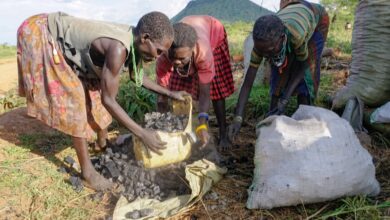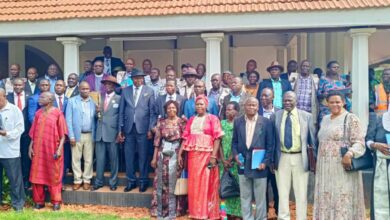Academia hails Tanzania Presidents Diplomacy as Cavendish University initiates memorial lecture
Benjamin Mpaka, the former Tanzanian president, served in the capacity of Chancellor of Cavendish University before he died on July 24, 2020, at the age of 81.

By Alex Pithua
Kampala: A section of academia in Uganda and Tanzania has hailed former presidents Benjamin Mpaka and Mwalimu Julius Nyerere for their significant contributions toward state formation and building across Africa.
This was during the second memorial lecture of Benjamin Mpaka held on November 29, 2023, at the Sheraton Hotel Kampala-Uganda.
This special event, which is meant to recognize and honor Benjamin Mpaka annually, is organized and championed by Cavendish University-Uganda under the theme “Diplomacy and contemporary state formation in Africa and the role of Benjamin Mkapa in the Moshi Conference of 1978.”
Benjamin Mpaka, the former Tanzanian president, served in the capacity of Chancellor of Cavendish University before he died on July 24, 2020, at the age of 81.
For his part, Professor Taris Bazana Kabwegyere, the guest of honor of the November 29, 2023, memorial lecture, revealed that Mpaka chaired the powerful 1978 Moshi Conference meeting, which led to the removal of the dictator of East Africa, who was the then president of Uganda, Idi Amin Dada, in 1979.
“Nyerere was not always in the meeting, but Benjamin Mpaka would lead a successful meeting.” Prof. Kabwegery recounted this during his speech.
He commended Cavendish University for honoring the late Benjamin Mpaka.
“It is good to memorize, prioritize, and pay tribute to Mpaka for 400 years.” Kabyegere told Cavendish University management
Cavendish University-Uganda was established in 2008, with another branch in Lusaka City, Zambia.
A special guest for the event Chairman of education review policy and a former minister of education and sports, Amanya Mushega, cheerfully recognized the contribution of Mwalimu Julius Nyerere as the mentor of Mpaka, adding that if Mpaka did not learn from Nyerere, he wouldn’t become a great man in Africa.
“It is difficult to talk about Mpaka without Mwalimu Nyerere in Africa; Mwalimu was a man with simplicity, humility, honesty, was pan-Africanist, had respect for himself and others, practiced democracy, and left power willingly.” Amanya Mushega alluded

“Mpaka was easy to approach; he appointed his main political contender as vice president during his tenure, and he chaired mediation and negotiation between President Paul Kagame of Rwanda and President Museveni of Uganda.” Amanya Mushega observed
Amanya Mushega said that Nyerere had a lot of respect for public resources, and all his positive attributes transformed Mpaka. She also praised him as a good time manager as he worked under Mpaka when he was Chairman of the East Africa community.
Keynote speaker, the former ambassador of Tanzania to Uganda, Dr. Aziz Ponary Mlima, who was also a personal assistant to the late president Benjamin Mpaka, noted his role in leading to the independence of some African states like Angola, Mozambique, and Zambia, the release of Nelson Mandela from prison, and eminent South African independence.
“In short, in his legacy, Benjamin Mpaka was an economic reformer, a great leader, a person with integrity, active in peace mediation, and a chief organizer of the Moshi Conference, which eventually led to the ousting of President Amin and the installation of Dr. Apollo Milton Obote in 1979.” Dr. Aziz explained
Professor Ndebesa Mwambutsya of Makerere University, who was one of the panelists, has implored that the former Tanzanian leaders played a good role for Uganda in the overthrow of Amin. He talked about state formation and diplomacy in Africa.
He said Mpaka did not force his view on Ugandans during the Moshi Conference, but it was only Ugandans who came to the conclusion in a rush.
Prof. Ndebese added that the Moshi conference did not handle the Ugandan question but only focused on military questions.

He added that the external summits have always contributed a lot to building states in Africa.
Executive director of Cavendish University, David Mutabanura, disclosed that Mpaka, as the second Cavendish University Chancellor, saw the university transformed with fewer resources, technology, enrollment, reputation, and human resources, and they had the privilege of having him as a chancellor.
“Since he died during the COVID-19 lockdown, we never had a chance to participate physically in his send-away. We thought his passing away should not be lost completely, and we should immortalize him annually. He had so many aspects.” Mutabanura
“He is a giant; he is like an elephant.” He added
Among the distinguished guests for this year’s Banjamin Mpaka memorial lecture were former president of the Federal Republic of Nigeria, who doubled as Cavendish University Chancellor Goodluck Jonathan, represented by Dr. Ashiru Tukur Inuwa, dean of faculty socio-economic sciences at Cavendish University; Mama Anna Mpaka, the former first lady of Tanzania; Vice Chancellor Cavendish University John Mugisha; Professor Olomolar; Brig. Felix Kulayigye; and Woman MP Gulu district Sharon Balmoyi, among others.
Mpaka was Chancellor of Cavendish University from 2014 to 2020.
Do you have a story about your community or an opinion to share with us? Email us at theugreports@gmail.com.






